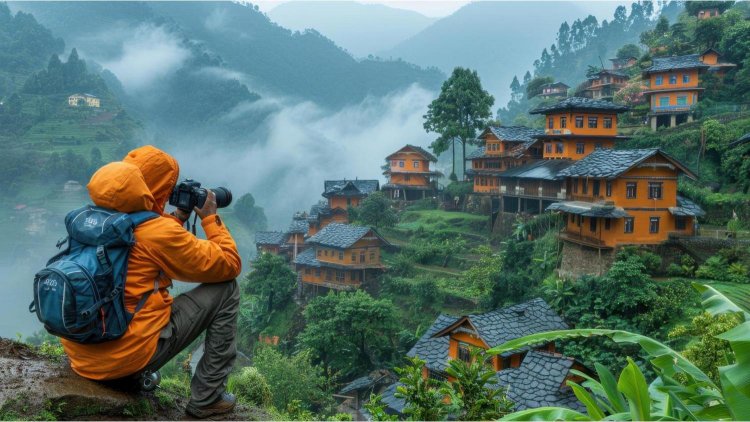Hidden Gems and Timeless Traditions: Travel Tips for Exploring Remote Villages in Asia
Exploring the remote villages of Asia offers a unique and profound travel experience. Nestled in lush landscapes, these villages provide an authentic glimpse into traditional lifestyles far removed from the bustling cities and tourist traps. Whether you're hiking through the highlands of northern Vietnam or venturing into the remote corners of Bhutan, these hidden gems offer not only breathtaking scenery but also an opportunity to connect with local cultures in a meaningful way. However, traveling to such off-the-beaten-path destinations requires careful planning and consideration. To ensure a smooth and enriching journey, here are six essential tips to help you navigate and enjoy your visit to remote villages in Asia.

Embrace the Slow Pace: Adjust Your Expectations
Remote villages in Asia often operate on their own rhythm, which can be a stark contrast to the fast-paced environment of urban areas. Understanding and embracing this slower pace is crucial for a fulfilling experience.
Adapt to Local Timings
Villages may not follow the strict schedules of modern life. Shops might close for several hours in the afternoon, or public transport could be infrequent. It’s important to adapt to these local timings and avoid the frustration of unmet expectations. For example, in parts of rural Thailand, markets might only open in the early morning and close by midday.
Be Patient with Services
Expect services to be less immediate than what you might be used to. This is not necessarily a shortcoming but rather part of the village's charm. In Bhutan, for instance, internet connectivity can be slow or intermittent, so be prepared for offline experiences and enjoy the digital detox.
Enjoy the Simplicity
The beauty of remote villages lies in their simplicity. There might be fewer amenities and conveniences, but this is part of the experience. Embrace the local way of life, whether it’s eating traditional foods cooked over a wood fire or staying in a basic guesthouse.
Respect Local Customs and Traditions: Engage Thoughtfully
Understanding and respecting local customs is vital when visiting remote villages. These communities often hold traditional practices and beliefs that might be unfamiliar to you.
Learn Basic Local Etiquette
Before traveling, research the local customs and etiquette. In Nepal, for example, it's customary to remove your shoes before entering a home or temple. Knowing such practices in advance can help you avoid unintentional disrespect.
Participate in Local Festivals and Traditions
Many villages have unique festivals and ceremonies that are central to their cultural identity. If your visit coincides with such an event, participate respectfully. In Bali, attending a traditional ceremony can provide deep insights into local spiritual practices.
Ask Before Taking Photos
Always ask for permission before taking photos of people or their property. In some cultures, photography can be considered intrusive or disrespectful. For instance, in parts of Myanmar, people might view photography as an invasion of their privacy.
Pack Smart: Essentials for Remote Travel
When visiting remote villages, packing wisely is crucial as resources may be limited. Here’s what to consider:
Prepare for Varied Weather Conditions
In remote areas, weather conditions can be unpredictable. Pack layers, including waterproof items and sun protection, to be prepared for sudden changes. The high-altitude regions of northern India can be chilly even during summer, while tropical areas might experience sudden rain showers.
Bring Essential Supplies
Basic necessities like medications, personal hygiene products, and durable clothing are essential. While some villages may have small shops, they might not stock everything you need. For example, in the Himalayan villages of Nepal, medical facilities can be far and few between.
Carry a Reusable Water Bottle
Access to clean drinking water might be limited in remote areas. Carry a reusable water bottle with a built-in filter to ensure you stay hydrated and minimize your environmental impact.
Respect Environmental Concerns: Travel Sustainably
Remote villages often rely heavily on their natural surroundings for sustenance. Your visit should minimize environmental impact to help preserve these pristine areas.
Practice Leave No Trace Principles
Adopt Leave No Trace principles by carrying out all trash and minimizing your footprint. In the rice terraces of northern Vietnam, for instance, it’s important to follow trails and avoid disturbing crops.
Support Eco-Friendly Initiatives
Choose to stay in eco-friendly accommodations and support local businesses that practice sustainable tourism. In Laos, several eco-lodges provide employment to locals and engage in conservation efforts.
Use Resources Wisely
Be mindful of resource use, such as water and electricity, which might be limited in remote areas. Simple actions like turning off lights and conserving water can make a big difference.
Engage with the Community: Build Genuine Connections
Building genuine connections with local residents can enrich your travel experience and foster positive interactions.
Learn Basic Local Language Phrases
Learning a few phrases in the local language can go a long way in building rapport. Even a simple greeting or thank you can show respect and open doors to deeper connections. In the tribal areas of India, for example, knowing basic phrases can help you interact more meaningfully with the locals.
Participate in Community Activities
Join in community activities and events where possible. This could be helping with local crafts or participating in traditional cooking classes. Such interactions not only provide a more immersive experience but also support the local economy.
Respect Privacy and Boundaries
While engaging with locals, always respect their privacy and boundaries. Avoid prying into personal matters and be considerate of local customs regarding interactions with visitors.
Prepare for Limited Connectivity: Disconnect to Reconnect
Many remote villages have limited or no connectivity, which can be both a challenge and a benefit.
Plan Ahead for Navigation
Without reliable GPS or internet access, it’s essential to have detailed maps and clear instructions. In Bhutan’s remote regions, relying on a local guide can be beneficial for navigation and ensuring you don’t get lost.
Embrace the Digital Detox
Limited connectivity can be an opportunity to disconnect from the digital world and immerse yourself in the present. Use this time to engage fully with your surroundings and the people you meet.
Inform Family and Friends
If you’ll be out of touch for an extended period, inform family and friends about your plans and provide them with emergency contact details. This is important for your safety and their peace of mind.
These tips will help ensure that your visit to remote villages in Asia is not only enjoyable but also respectful and impactful. Embracing the slower pace, respecting local customs, packing wisely, practicing sustainability, building genuine connections, and preparing for limited connectivity are all key to a successful and rewarding journey.
By following these guidelines, you’ll not only enrich your travel experience but also contribute positively to the communities you visit. Remember, the essence of travel lies not just in the destinations you reach but in the experiences and connections you make along the way.
Embracing the Unexpected: Final Tips for Your Remote Village Adventure
As you prepare for your journey to remote villages in Asia, remember that flexibility and open-mindedness will serve you well. Each village has its own unique characteristics and challenges, so being adaptable can enhance your overall experience.
Understand the Local Infrastructure
Remote villages often have limited infrastructure. Be prepared for less-developed roads, basic accommodation, and minimal public amenities. Understanding this in advance will help you manage your expectations and adapt to the environment more smoothly.
Be Mindful of Health and Safety
In remote areas, healthcare facilities might be sparse, so it's important to take preventive measures to safeguard your health. Make sure you're up-to-date with vaccinations and carry a basic first aid kit. In case of emergencies, having a local contact or guide can be invaluable for assistance and navigating any potential issues.
Travel with a Local Guide
Whenever possible, travel with a local guide who is familiar with the area. They can offer invaluable insights into the culture, customs, and best practices for interacting with the community. In regions like rural Cambodia, a knowledgeable guide can provide not only safety and navigation assistance but also a richer understanding of local traditions and practices.
Practice Cultural Sensitivity
Be aware that your presence in a remote village might attract curiosity or attention. Handle this respectfully by engaging in a culturally sensitive manner and showing appreciation for the local way of life. In many villages, personal interactions can significantly impact how you're perceived, so approach each encounter with respect and humility.
Enjoy the Journey
Lastly, relish the journey itself. The experience of traveling to remote villages is often marked by unique encounters and unexpected moments. Embrace these opportunities with an open heart and mind, and let the journey be as rewarding as the destination.
Disclaimer
The travel information and recommendations on this blog are intended for general guidance and inspiration. Conditions and regulations can change quickly, so please verify all details with appropriate sources before making travel plans. We are not liable for any errors, omissions, or outcomes resulting from your use of this information. Travel involves inherent risks, and it's essential to prioritize your safety and well-being. Always travel with adequate insurance and take necessary precautions.
What's Your Reaction?





















